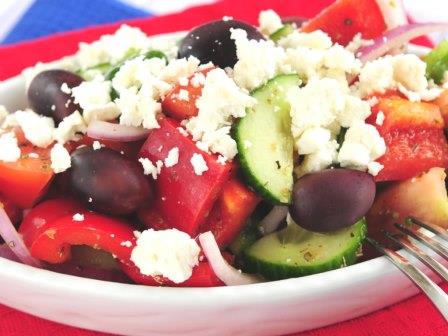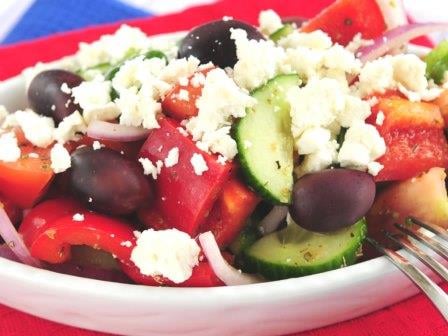Do you ever wish you could find a diet that is delicious, easy, can improve your health, and doesn’t leave you hungry? Maybe even a diet that promotes enjoying a glass of red wine with family and friends? There is no way that exists, right? Wrong.
Our friends that live on the Mediterranean coast have it right. Their traditions and eating patterns have been developing for more than 5,000 years and were first studied more than fifty years ago. These studies have brought recognition to the health benefits of what was originally called, “the Poor Man’s Diet,” which we now know as “The Mediterranean Diet.”
 Although its name says otherwise, this is not what most people typically consider a ‘diet.’ It is not a restrictive meal plan or one that eliminates certain food groups. Instead, it is more of a lifestyle and a shift in the most common ingredients being used for cooking. It not only involves dietary changes, but also includes a recommendation to be physically active and enjoy meals with family and friends, which are two of my favorite aspects of the lifestyle.
Although its name says otherwise, this is not what most people typically consider a ‘diet.’ It is not a restrictive meal plan or one that eliminates certain food groups. Instead, it is more of a lifestyle and a shift in the most common ingredients being used for cooking. It not only involves dietary changes, but also includes a recommendation to be physically active and enjoy meals with family and friends, which are two of my favorite aspects of the lifestyle.
Let’s delve further into these six major aspects of the diet…
1. Replace your red meat with seafood and legumes.
Limit your red meat servings to about 3 ounces (about the size of a deck of cards) and try to stick to consuming it only 2-4 times per month. Instead, increase your consumption of seafood; particularly fatty fish rich in omega 3s such as lake trout, salmon, herring, mackerel, and tuna. This swap can reduce your intake of the saturated fats and cholesterol that increase your risk for heart disease. Consuming fish with omega 3 unsaturated fatty acids can reduce your risk for heart disease. Because omega 3s have an anti-inflammatory effect, they can be beneficial for your entire body.
Although this diet doesn’t include a whole lot of red meat or poultry, any lack of protein can be made up with legumes. Try making hummus out of chickpeas, throw black beans in your salsa or quesadilla, and incorporate kidney beans in your salad, chili, or soup. Legumes will also load you up with lots of fiber that can reduce the risk of heart disease and improve gastrointestinal health.
2. Eat 6 or more servings of fruits and vegetables.
Incorporate as many fruits and vegetables as you can (in all different colors!) to get a wide array of nutrients, antioxidants, and even fiber. Make a fruit chutney to top your grilled fish, try a fruit salad for dessert, sauté fresh veggies in olive oil, garlic, and herbs or make a salad as a side to your meal. You can make your own veggie burgers from scratch, and even package up fresh apple slices, carrot sticks, or snap peas for on-the-go snacks. If you can’t buy and eat fresh produce quickly enough, try unsalted/ unsweetened canned or frozen varieties.
3. Make the switch to whole grains and avoid processed carbohydrates.
The Mediterranean diet is rich in a variety of whole grains— including bread. Whole grains offer their own set of antioxidants, nutrients, and fiber (just like fruits and vegetables). But the difference is not just switching from refined to whole grain, but also making the switch to unprocessed baked goods that are free of preservatives and trans fats.
4. Season with herbs and spices instead of salt.
The Mediterranean diet is very flavorful, but the majority of it comes from herbs, spices, garlic and the rich flavor of healthy oils rather than salt. Flavor your food using small amounts of sea salt after the meal has been cooked if you feel you need something extra. Reducing sodium intake can reduce blood pressure and the risk of heart disease.
5. Replace unhealthy fats with extra virgin olive oil, canola oil, nuts, and seeds.
Instead of cooking with margarine or butter, try sautéing foods in extra virgin olive oil or canola oil and dip bread in extra virgin olive oil with herbs instead of spreading on butter. Canola and extra virgin olive oil are rich in monounsaturated fatty acids. They promote lower levels of total cholesterol and LDL (bad) cholesterol, increase the beneficial HDL cholesterol, can have a beneficial effect on blood clotting, and also act as an anti-inflammatory.
Nuts are also a healthy source of fats and make a great on-the-go snack or addition to foods like oatmeal, yogurt, salads, or even cooked vegetables.
Remember that although these are healthy sources of fat, they are still high in calories and should be consumed in moderation.
6. Make water your primary drink and enjoy a glass of red wine with dinner.
Swap out your sugary beverages for water or unsweetened iced tea. This can reduce not only your sugar intake, but also reduce calories and consumption of other unwanted dyes and additives often found in drinks. If you want to enjoy a glass of red wine, stick to one 5 oz. glass per day for women and
up to two 5 oz. glasses for men. In moderation, wine can offer antioxidants and reduce your blood pressure and stress levels. When consumed in excess, wine can do more harm than good, so stick to one to two glasses if you decide to enjoy it.
If you follow these key steps of the Mediterranean diet you can reap the many benefits it has to offer, including reduced risk of heart disease, cancer, reduced blood pressure, lower total cholesterol and LDL cholesterol levels, improved brain function and fertility, protection against Alzheimer’s and Parkinson’s disease, and an overall increased lifespan. Check out this great resource from Oldways that shows the extensive research done on the Mediterranean diet linking it to improved health.
If you enjoyed this healthy lifestyle post, here are some others you may be interested in:
- Healthy Eating Doesn't Have To Be Hard
- How to Bust a Fad Diet
- 10 Tips to Fight Inflammation (Hint: Eat Whole Grains & Real Food)
Whole grains are just one part of the Mediterranean diet, but its one we know a whole lot about. Our Registered Dietitian and Nutrition Specialist (who wrote this blog post) also authored our Guide to Whole Grains. Get it here:





